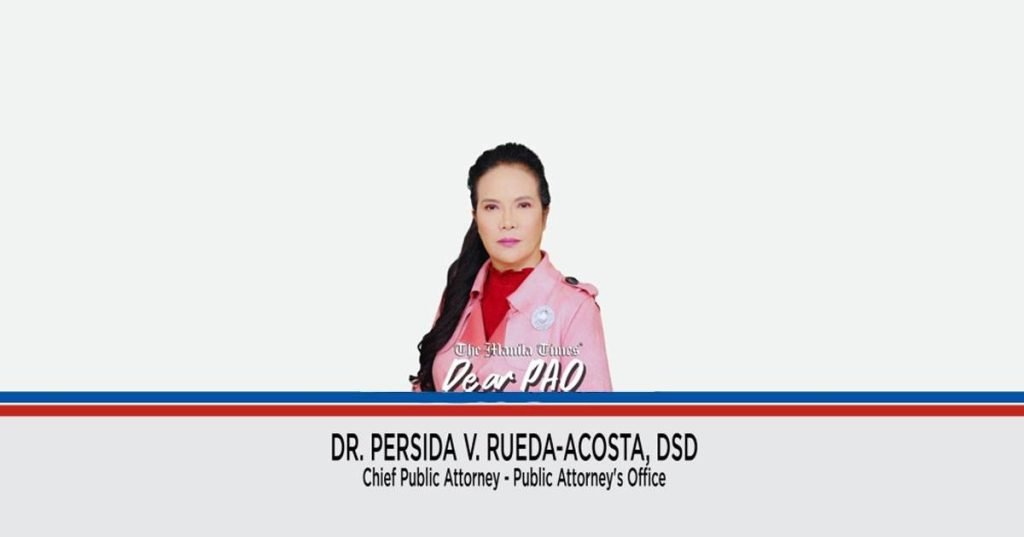
Dear PAO,
Is the crime of robbery still committed if the alleged robbers were not able to completely take away the property that was the subject of the supposed robbery? R was charged with robbery but, according to him, there is no crime of robbery because he was not able to really take the purse of the victim, S. It turns out that, as he was fleeing from the scene of the incident, R dropped the purse of S which he allegedly forcibly took. S was able to eventually recover her purse. Please advise.
Luis
Dear Luis,
The crime of robbery is defined under Article 293 of the Revised Penal Code, which provides:
“Article 293. Who are guilty of robbery. – Any person who, with intent to gain, shall take any personal property belonging to another, by means of violence or intimidation of any person, or using force upon anything shall be guilty of robbery.”
According to the Supreme Court:
“To warrant a conviction of the crime of Robbery, the following elements must concur: 1) there is a taking of personal property; 2) the personal property belongs to another; 3) the taking is with animus lucrandi or intent to gain; and 4) the taking is with violence against or intimidation of persons or with force upon things. x x x” (Ruel Poquiz y Orcine and Rey Valencia y Galutan v. People of the Philippines, GR 238715, Jan. 11, 2021, Ponente: Associate Justice Edgardo Delos Santos)
Applying the foregoing, we submit that R may be held liable for the crime of robbery if it can be clearly established that (1) he took the purse; (2) the purse is the property of S; (3) there was intent to gain on the part of R; and (4) the taking was without the consent of S and was done by R with violence or intimidation or with force upon things.
The third element, the intent to gain, is often difficult to prove as it is an internal aspect or the workings of the mind. However, such can be established through the overt acts of the accused. In fact, our courts have held that the person’s intent to gain may be presumed from the taking of personal property without the owner’s consent and that there can still be unlawful taking even if the person accused was not able to take complete possession of the property or to dispose of the same. As explained by the Supreme Court:
“In Consulta v. People, the Court held that animus lucrandi or intent to gain is an internal act which can be established through the overt acts of the offender. The offender’s intent to gain may be presumed from the forcible taking of useful property pertaining to another, unless special circumstances reveal a different intent on the part of the perpetrator. In People v. Hernandez, the Court held that, in cases of Robbery, the crime is considered complete from the moment the offender gains possession of the thing even if he has no opportunity to dispose of the same, to wit:
“In robbery, there must be an unlawful taking or apoderamiento, which is defined as the taking of items without the consent of the owner, or by means of violence against or intimidation of persons, or by using force upon things. Taking is considered complete from the moment the offender gains possession of the thing, even if he has no opportunity to dispose of the same. There is, likewise, no need to prove the exact amount of money taken, as long as there is proof of the unlawful taking. Intent to gain, or animus lucrandi, as an element of the crime of robbery, is an internal act; hence, presumed from the unlawful taking of things.
“A careful review of the records and the testimony of Belver shows that Belver’s bag was already forcibly taken, and Belver was dispossessed of the same when Poquiz and Valencia left the scene of the crime. Poquiz and Valencia fled in fear and dropped the bag after Belver fired his gun. When Poquiz and Valencia unlawfully took Belver’s bag, the crime of Robbery had been fully consummated. It is of no moment that Belver was able to subsequently recover the items forcibly taken from him. Such instance does not preclude the presence of intent to gain on the part of Poquiz and Valencia.” (Poquiz v. People; Emphasis supplied)
We hope that we were able to answer your queries. This advice is based solely on the facts you have narrated and our appreciation of the same. Our opinion may vary when other facts are changed or elaborated.
Editor’s note: Dear PAO is a daily column of the Public Attorney’s Office. Questions for Chief Acosta may be sent to [email protected]






